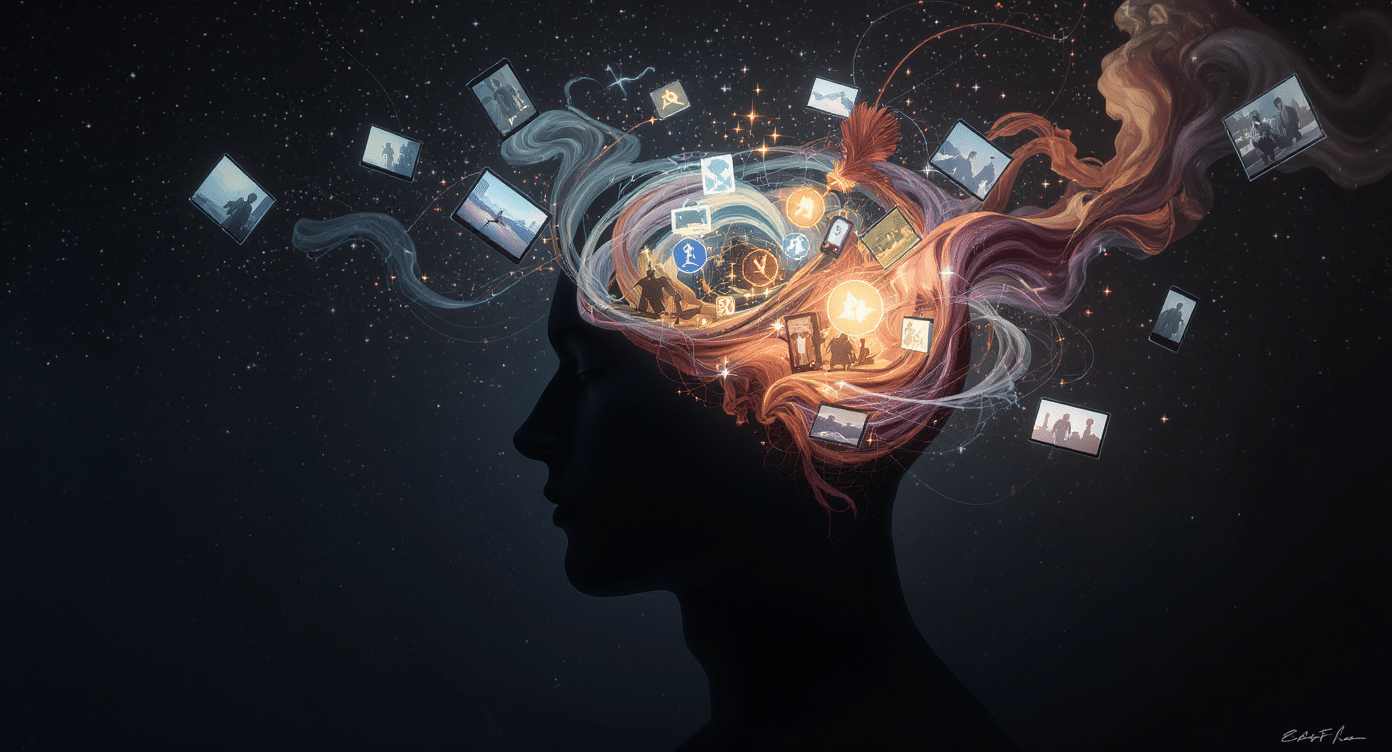Have you ever wondered why some messages stick with you for years while others fade within minutes?
The answer lies in how they’re presented to you. Stories have been shaping human behavior since the beginning of time. From ancient cave paintings to modern social media posts, we use stories to share knowledge, build connections, and make sense of our world.
In this blog, I’ll show you how the power of storytelling influences every aspect of our lives and why understanding this skill can change how you communicate forever.
Why Stories Matter More Than Facts
Science reveals an interesting aspect of how we process information. When someone presents us with facts and figures, only two areas of our brain become active.
But when we hear a story, our entire brain lights up. We don’t just hear the words – we experience them.
This happens because stories trigger multiple senses at once. When someone describes a warm summer day, your brain activates the same areas that process actual warmth. When they mention the sound of rain, your auditory centers respond as if you’re really hearing it.
Facts Tell, Stories Sell: People forget statistics, but they remember stories. You might not remember that 73% of people prefer product A over product B. But you’ll remember the story about how product A helped a family save their home during a flood.
How Stories Shape Our Daily Decisions

Every day, you tell yourself hundreds of mini-stories. “I’m not good at math” is a story. “I’m a morning person” is another story.
These internal narratives shape what you believe about yourself and what you think you can achieve. The problem? Many of these stories aren’t even true.
They’re based on one bad experience or something someone told you years ago. But because you keep repeating them, they become your reality.
Turn on any news channel or scroll through social media. Everything is presented as a story. The news doesn’t just report facts – it creates narratives with heroes, villains, and plot twists. This storytelling approach makes information more engaging, but it also shapes our perception of the world.
The stories we consume influence our opinions, fears, and hopes.
The Science Behind the Power of Storytelling
Research reveals intriguing insights about what happens in your brain when you hear a story. Understanding this science helps explain why stories feel so real and why they affect us so deeply.
Emotional Connection Through Narratives
When you hear a good story, your brain releases chemicals like oxytocin and dopamine. Oxytocin makes you feel connected to others. Dopamine makes you feel good and want more.
This chemical response explains why:
- You binge-watch TV shows
- You get emotionally invested in book characters
- You share personal stories with friends
- You remember advertisements that tell stories
Mirror Neurons and Empathy
Your brain has special cells called mirror neurons. These cells fire both when you perform an action and when you observe someone else doing it. Stories activate these neurons, making you feel like you’re experiencing what the characters experience.
This is why you might cry during a sad movie or feel nervous when a character faces danger. Your brain can’t always distinguish between real experiences and lively stories.
Stories That Changed History
Throughout human history, certain stories have shaped entire civilizations and sparked major changes. These powerful narratives show us how stories can unite people and inspire action on a massive scale.
Religious and Cultural Stories
Think about the most influential stories in human history. Religious texts, creation myths, and cultural legends have shaped entire civilizations. These stories don’t just entertain – they provide moral guidance, explain natural phenomena, and create shared values.
The power of storytelling in these contexts shows us how narratives can:
- Unite communities
- Preserve knowledge across generations
- Inspire action and change
- Create meaning in chaos
Modern Examples
In recent history, stories have continued to shape our world:
- Martin Luther King Jr.’s “I Have a Dream” speech painted a lively portrait of a better future
- Environmental campaigns use stories of polar bears and melting ice caps to motivate action
- Brands like Nike tell stories about overcoming obstacles and achieving greatness
How to Use Storytelling in Your Life
Knowing the power of stories is one thing, but using this knowledge effectively is another.
Here are practical ways to apply storytelling skills in your personal relationships, career, and daily interactions
| Area | How Storytelling Helps | Why It Works |
|---|---|---|
| Personal Relationships | Share specific stories instead of general statements, such as “I had a bad day.” | People connect with details and emotions, making them feel closer to you |
| Career Success | Make presentations engaging, explain complex ideas, build client trust, and stand out in interviews | Stories make information memorable and create emotional connections with colleagues and clients |
| Learning & Teaching | Wrap lessons in stories to help others remember key points | Teachers using stories keep students engaged longer; parents teach life lessons more effectively |
The Dark Side of Stories

Another power of storytelling is that not all stories serve good purposes, and the same power that makes them helpful can make them dangerous. Being aware of how stories can mislead helps you become a smarter consumer of information.
Not all stories serve good purposes. The same power that makes stories helpful can make them dangerous.
False stories can spread misinformation, create unfair stereotypes, manipulate emotions for harmful purposes, and divide communities instead of uniting them.
In our information-rich world, you need to think critically about the stories you consume. Ask yourself who is telling this story and why, what facts support this narrative, what perspective might be missing, and how this story makes you feel, and if that’s the intended goal.
Building Your Story Skills
Great storytelling is a skill that can be developed with practice and patience. These simple techniques will help you craft more engaging and memorable stories in any situation.
1. Start with Simple Stories: You don’t need to be a professional writer to tell good stories. Start with simple, true stories from your own life. Focus on a specific moment or event, clear details that help others visualize the scene, how you felt, what you learned, and why this story matters to your audience.
2. Practice Active Listening: The best storytellers are also great listeners. Pay attention to how others tell stories. Notice what keeps your attention and what makes you lose interest. Learn from both good and bad examples.
3. Read Widely: Reading different types of stories expands your storytelling toolkit. Read fiction, biographies, news articles, and even social media posts. Notice different techniques and styles.
The Future of Storytelling
Technology continues to change how we create and share stories, but the human need for meaningful narratives remains constant. Understanding these changes helps you stay connected in our digital world.
- Social media platforms now favor short, visual stories that capture attention within seconds
- Video content combines words, images, and sound to create more immersive storytelling experiences
- Virtual reality technology may soon allow us to step directly inside stories and experience them firsthand
- Artificial intelligence can generate basic content, but struggles with the emotional truth that makes stories truly powerful
- Interactive storytelling through apps and games lets audiences participate in shaping story outcomes
Conclusion
The power of storytelling reaches into every corner of human experience. From the bedtime stories that shaped your childhood to the news stories that influence your daily decisions, narratives guide how you think, feel, and act.
Stories will continue shaping our world as long as humans exist.
The question is: what stories will you choose to tell and believe? Share your thoughts in the comments below – I’d love to hear about a story that changed your life or influenced your thinking






































